- Registration opens for 2021 WatITis conference
- Trick or Treaty? Treaties Recognition Week will include film screening
- Professor Katie Plaisance named one of Ontario's outstanding university teachers
- Fish consumption still safe despite initial fears over mercury levels
- Cybersecurity awareness: get wordy
- Your Daily Inspiration continues and other notes
Editor:
Brandon Sweet
University Communications
bulletin@uwaterloo.ca
Registration opens for 2021 WatITis conference

A message from Nathan Lee and Shah Chandon, WatITis committee chairs.
The 19th annual WatITis conference will be held virtually via Microsoft Teams on Wednesday, December 8, 2021. Registration is now open and will remain open until Thursday, November 25, 2021. Sign up early to get a spot in your favourite sessions. On the registration page, University of Waterloo employees will need to log in before registering.
Network with other IT professionals and learn more about information technology initiatives at the University of Waterloo. Hear from a variety of presenters including two keynote speakers:
- Cat Coode - founder of Binary Tattoo, one of Canada’s Top 20 Women in Cybersecurity 2021
- Professor Mark Giesbrecht - Waterloo’s Dean of Mathematics, founding member of the Ontario Research Centre for Computer Algebra
For more information about WatITis, visit https://uwaterloo.ca/watitis/. Join our mailing list so you don’t miss out on conference updates.
Trick or Treaty? Treaties Recognition Week will include film screening
A message from the Office of Indigenous Relations.
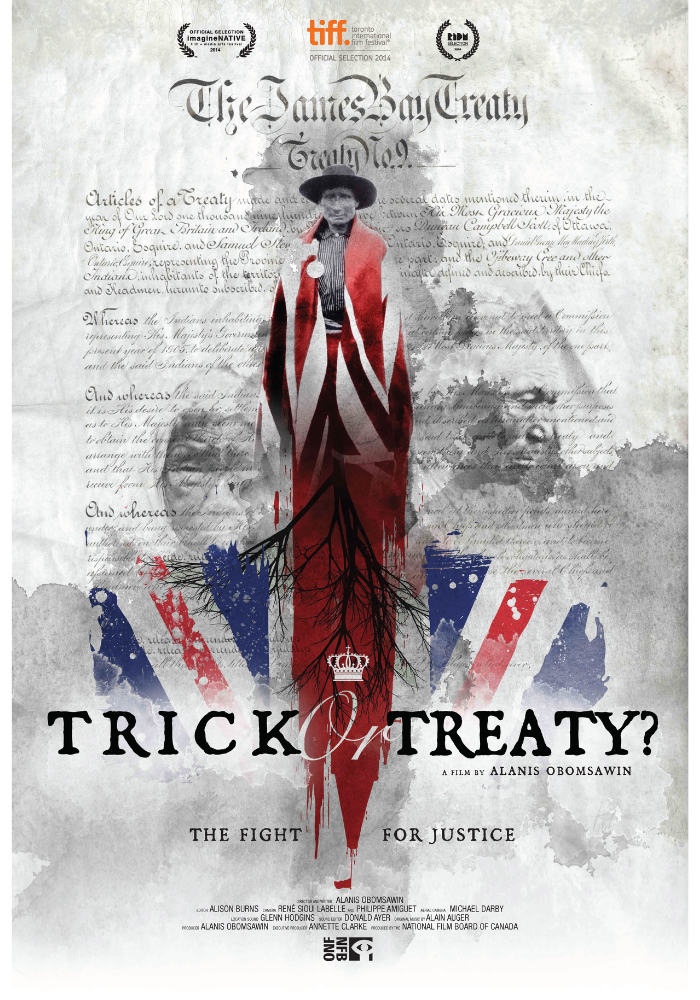
The Office of Indigenous Relations is excited to share an event in honour of Treaties Recognition Week, which runs from November 1 to 5. On November 3, join a free, virtual community screening of the acclaimed film Trick or Treaty? directed by Alanis Obomsawin.
The film will be followed by a discussion with Indigenous Relations Coordinator Robin Stadelbauer and Professor Susan Roy. This is open to all members of the Waterloo campus community and beyond. Learn more about this event and register.
Additional information on other ways to engage during Treaties Recognition Week will be announced on Monday, November 1.
Professor Katie Plaisance named one of Ontario's outstanding university teachers
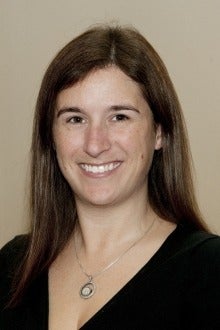
Kathryn (Katie) Plaisance, an associat professor in the Department of Knowledge Integration has received a 2020-2021 Ontario Confederation of University Faculty Associations (OCUFA) Teaching Award for her outstanding contributions to the quality of higher education at Ontario’s universities.
“One of the qualities that set Kathryn Plaisance apart as an educator, is that she sees students as key stakeholders in their own learning,” said Associate Professor Edmund Pries, chair of OCUFA’s Award Committee. “She creates a safe and inclusive learning environment where students are encouraged to take risks, share their vulnerabilities, and integrate an understanding of their own identities and beliefs into their work.”
Professor Plaisance was one of seven OCUFA teaching award winners named this year.
Professor Plaisance received her Bachelor of Science in both Philosophy and Molecular Biology from the University of Wisconsin in 2000, followed by a Masters and PhD in Philosophy, with a minor in Bioethics, from the University of Minnesota in 2006. Before coming to the University of Waterloo, Katie was a postdoctoral fellow in the Center for Philosophy and Ethics of Science at the Leibniz University of Hannover in Germany.
The recipients of the awards are being honoured in a special video celebrating their achievements.
Founded in 1964, OCUFA represents 17,000 professors and academic librarians in 30 faculty associations across Ontario.
Fish consumption still safe despite initial fears over mercury levels
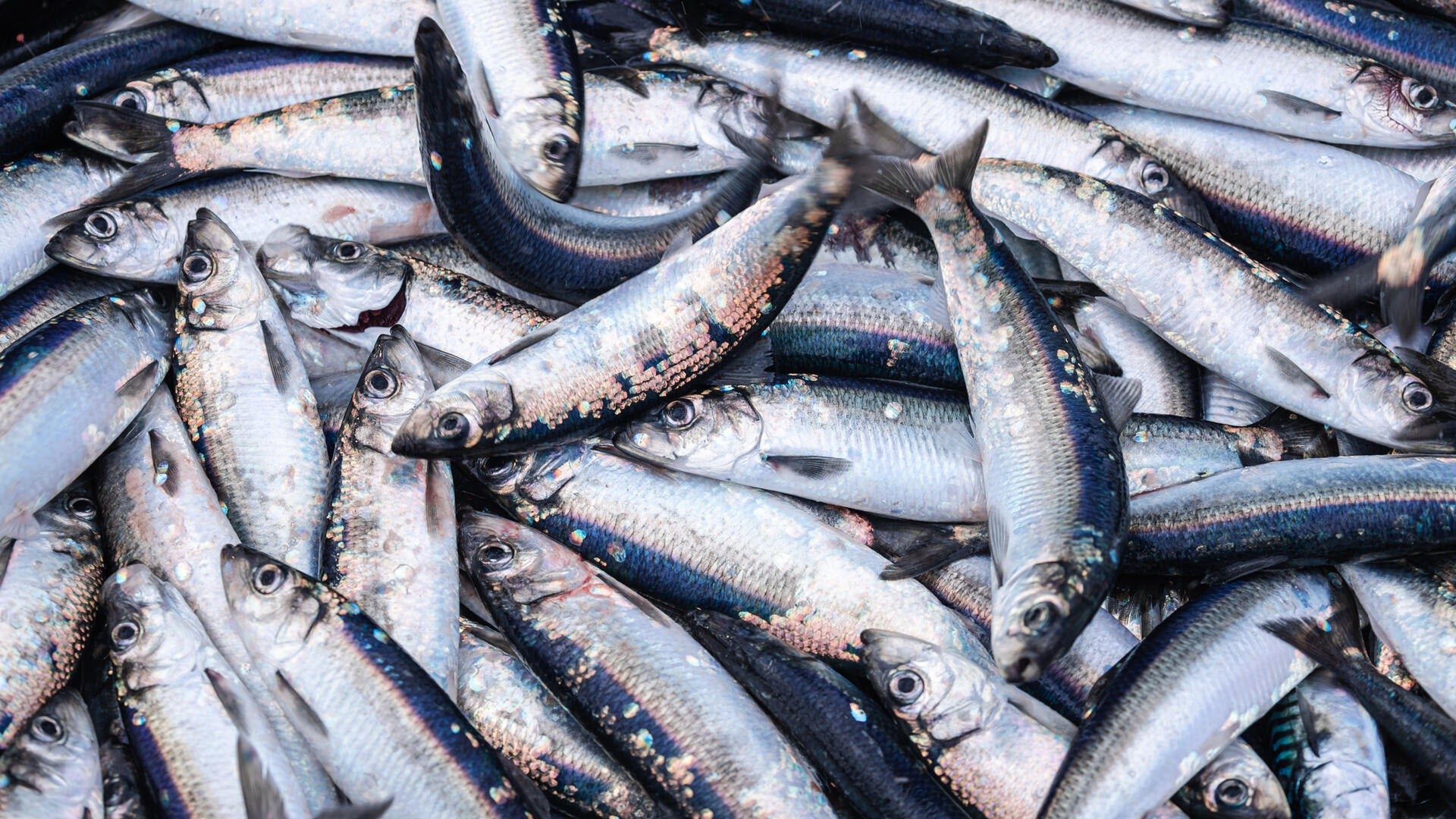
This article originally appeared on Waterloo News.
The benefits of consuming traditional foods tend to outweigh the risks of possible mercury contamination, according to a recent study.
The research, which was part of a larger biomonitoring project to address community concerns about environmental contaminants in traditional foods, such as fish, also found that mercury exposure in people may be low even when it is sometimes present in elevated levels. Additionally, the researchers discovered that mercury levels in people in northern regions vary by season and region.
“Previously, elevated levels of mercury were found in some fish species in some lakes and therefore, communities wanted to know if these sometimes-elevated levels in fish also meant they were elevated in people,” said Sara Packull-McCormick, a PhD candidate at the University of Waterloo’s School of Public Health Sciences.
“The good news is that generally, the exposure in communities we studied was low. It means the benefits of consuming these foods tend to outweigh the risks, which is important for these communities since fish consumption has nutritional, cultural and economic benefits.”
In conducting the study, the researchers obtained 443 blood samples and 276 hair samples to determine mercury levels present in the body. Generally, the measured human mercury exposures were relatively low. They also used a Food Frequency Questionnaire to assess fish intake, with 170 people participating. The responses showed that total fish intake peaked in late summer, decreased during the winter and increased again in the spring. Hair mercury levels seemed to follow the same seasonal pattern as fish intake but peaked in the fall.
The advantage of blood monitoring is that it provides an accurate snapshot of recent mercury levels. However, blood samples are more invasive, require specialized personnel to draw them, as well as consistent refrigeration. The researchers wanted to see if hair samples, which are easier to collect and show mercury levels over a larger span of time, could be used at the individual level. They found that the ratios between blood and hair mercury levels were inconsistent, meaning blood levels cannot be accurately estimated for an individual based on a hair sample.
Elevated levels of mercury can have negative effects on human development and health, including increased risk of cardiovascular disease and neurodevelopmental impairment. The Canadian Health Measures Survey measured mercury in human biological samples but did not include participants from the Canadian territories or Indigenous peoples living on reserves.
“This study is important because it provides these communities with the information they need to help guide their decision-making,” said Brian Laird, a professor in the School of Public Health Sciences and principal investigator. “Mercury can pose serious risks to people’s health, but these communities now have a baseline to see what changes occur in the future, especially taking into account those that may be caused by climate change.”
The study, “Hair to blood mercury concentration ratios and a retrospective hair segmental mercury analysis in the Northwest Territories, Canada,” was co-authored by Sara Packull-McCormick, Mylène Ratelle, Christina Lam, Jean Napenas, Michèle Bouchard, Heidi Swanson, and Brian Laird. It was published in the journal Environmental Research.
Cybersecurity awareness: get wordy

A message from Information Systems & Technology (IST). October is Cybersecurity Awareness Month, and the UW Information Security Services team will be bringing you some simple hints to allow you to be cyber secure.
Many on-line services have you enter a password to protect your account. Instead of using a mess of arbitrary unrelated characters as a password, use a longer easy-to-remember passphrase. “Lego and bare feet make me cry” is hard for an attacker to guess but trivial for you to keep in mind. Even if you are required by a login system to include different types of characters in a passphrase, this can still be easy to do, for example “My cat is #1 in my heart!”.
You can find more information on secure passphrases at https://uwaterloo.ca/cyber-awareness/#password.
Your Daily Inspiration continues and other notes
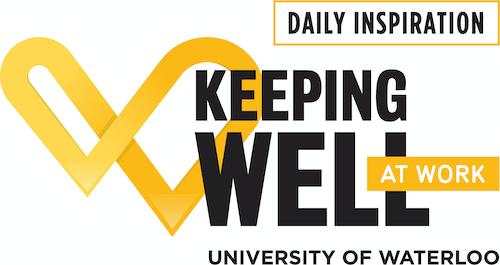
Today's Daily Inspiration
What would 30 minutes for yourself mean to you today?
What would you do if you had the gift of a free, unencumbered half hour today? Would you finally go for that walk? Would you take care of a task that's been holding you back? Would you call someone you've been thinking about? Would you nap?
Give yourself permission to take 30 minutes of time to do just what you need today. You will be amazed at the energy, positivity and relief it can give you.
See all Daily Inspirations on the Keeping Well at Work conference site. Questions and contest entries can be sent to ohd@uwaterloo.ca or tweet @OHDuwaterloo.
The next Knowledge Integration seminar, “Convergence Science Teams”, will feature speaker Dr. Maritza Salazar Campo, assistant professor at The Paul Merage School of Business, University of California Irvine.
"The complexity of scientific problems, coupled with a growing need for specialized expertise, requires the formation of teams of experts who collaborate across disciplinary boundaries to generate scientific breakthroughs," says the lecture background material. "The variety of knowledge available in convergence science teams provides the breadth of expertise to tackle complex problems that would be intractable by a single discipline. This presentation demonstrates the use of formal interventions to support early-stage discovery collaborations focused on curing devastating diseases."
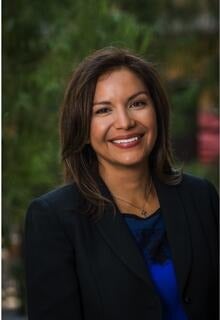
Maritza Salazar Campo is an Assistant Professor of Organization & Management at the Paul Merage School of Business, University of California Irvine. Her research focuses on knowledge integration, learning and innovation in interdisciplinary teams. Dr. Salazar Campo is a graduate of Stanford University, USC., and has her Ph.D. in Business Administration from NYU’s Stern School of Business. She is the Founding President of the International Network for the Science of Team Science (INSciTS), Program Director of Team Science at UC Irvine and UCLA, and a lead contributor to the Team Science Acceleration Lab at UCI.
The seminar takes place on Friday, October 29 at 1:00 p.m. The seminar is open to friends and visitors.

It's that time again: time for another Battle of Waterloo. The Warriors Football team will be taking on Laurier on Warrior Field this coming Saturday, October 30 with kick-off starting at 1:00 p.m. Tickets are free for all UWaterloo students, however due to limited capacity, Athletics recommend that you reserve them ahead of time. You can also watch online at OUA.TV.
Upcoming office closure
The Writing and Communication Centre (WCC) will be closed Friday October 29 for professional development. All WCC programs will be resuming the following business day.
Link of the day
When and Where to get support
Students can visit the Student Success Office online for supports including academic development, international student resources, immigration consulting, leadership development, exchange and study abroad, and opportunities to get involved.
Instructors looking for targeted support for developing online components for blended learning courses, transitioning remote to fully online courses, revising current online courses, and more please visit Agile Development | Centre for Extended Learning | University of Waterloo (uwaterloo.ca).
Instructors can visit the Keep Learning website to get support on adapting their teaching and learning plans for an online environment.
Course templates are available within your course in LEARN to help you build and edit your content and assignment pages quickly.
The following workshops, webinars, and events are offered by the KL team (CTE, CEL, ITMS, LIB):
- Independent Remote Course Design Essentials, self-directed, continuous self-enrollment course in LEARN.
- Independent Blended Course Design (iBlend), self-directed, ongoing
- Copyright Overview for Waterloo Instructors and Staff - self-directed, continuous self-enrollment course in LEARN.
-
Thirty Minute Thursdays– PebblePad – Offered:October 28, November 11, November 18, November 25, 12:00 noon to 12: 30 p.m.
-
Online Instructional Skills Workshop (ISW) (CTE8601), begins on October 22, 8:00 a.m.
-
Getting Ready to Facilitate Online Courses: TA Training, beginning November 1.
Employees can access resources to help them work remotely, including managing University records and privacy of personal information. Here are some tips for staying healthy while working from home.
Stay informed about COVID cases on campus by consulting the COVID case tracker.
The Writing and Communication Centre has virtual services and programs to help undergrads, grad students, postdocs and faculty members with academic writing.
- Meet with writing advisors in one-to-one appointments to brainstorm, draft, revise, and polish. No time for an appointment? Try email tutoring for undergrads.
- Beat isolation and make writing progress at weekly Virtual Writing Cafés for grad students and faculty or PJ-Friendly Writing Groups for Undergrads.
- Take an online workshop or apply to our popular Dissertation Boot Camp program.
- Faculty can request custom in-class workshops for their courses, or the WCC can facilitate any existing workshops for student groups.
Co-op students can get help finding a job and find supports to successfully work remotely, develop new skills, access wellness and career information, and contact a co-op or career advisor.
The Centre for Career Action (CCA) is offering some in-person services for fall 2021. The Tatham Centre is open with front-desk support, limited in-person appointments and co-op consults. Services are also available virtually. Book an appointment online or Live Chat with our Client Support Team. The CCA is here to help.
If you feel overwhelmed or anxious and need to talk to somebody, please contact the University’s Campus Wellness services, either Health Services or Counselling Services. You can also contact the University's Centre for Mental Health Research and Treatment. Good2Talk is a post-secondary student helpline available to all students.
While the Library continues to focus on digital resources and consultations, our spaces are open for the fall term. Dana Porter Library is open Monday to Friday, 9 a.m. to 5 p.m., and Davis Centre Library is open Monday to Friday, 9 a.m. to 11 p.m., and Saturday and Sunday, 11 a.m. to 5 p.m. for drop-in individual study space, bookable individual study rooms, drop-in access to computers and printers, book pick-up services and IST Help Desk support. Special Collections & Archives and the Geospatial Centre will be accessible by appointment. Library staff are available for questions via Ask us. Full details on current services and hours are available on the Library’s COVID-19 Update webpage.
The Faculty Association of the University of Waterloo (FAUW) continues to advocate for its members. Check out the FAUW blog for more information.
The University of Waterloo Staff Association (UWSA) continues to advocate for its members. Check out the UWSA blog for more information.
The Sexual Violence Prevention and Response Office (SVPRO) supports all members of the University of Waterloo campus community who have experienced, or been impacted, by sexual violence. This includes all students, staff, faculty and visitors on the main campus, the satellite campuses, and at the affiliated and federated Waterloo Institutes and Colleges. For support, email: svpro@uwaterloo.ca or visit the SVPRO website.
The Office of Indigenous Relations is a central hub that provides guidance, support, and resources to all Indigenous and non-Indigenous campus community members and oversees the University's Indigenization strategy.
The Waterloo Indigenous Student Centre, based at St. Paul’s University College, provides support and resources for Indigenous students, and educational outreach programs for the broader community, including lectures, and events.
WUSA supports for students:
Peer support - MATES, Glow Centre, RAISE, Women’s Centre - Visit https://wusa.ca/peersupport to book an appointment either in person or online for the Fall term!
Food Support Service food hampers are currently available from the Turnkey Desk 24/7 in the Student Life Centre. Drop off locations are also open again in SLC, DC, DP, SCH and all residences.
Co-op Connection all available online. Check https://wusa.ca for more details.
Centre for Academic Policy Support - CAPS is here to assist Waterloo undergraduates throughout their experience in navigating academic policy in the instances of filing petitions, grievances and appeals. Please contact them at caps@wusa.ca. More information is available.
WUSA Student Legal Protection Program- Seeking legal counsel can be intimidating, especially if it’s your first time facing a legal issue. The legal assistance helpline provides quick access to legal advice in any area of law, including criminal. Just call 1-833-202-4571.
Empower Me is a confidential mental health and wellness service that connects students with qualified counsellors 24/7. They can be reached at 1-833-628-5589.
When and Where (but mostly when)
Healthy Warriors at Home (Online Fitness)
Warriors vs. Laurier Blood Donation Battle. Join your fellow Warriors, donate blood and help us win the Blood Battle against Laurier for a second year in a row. Set up a profile or add the PFL code: UNIV960995 to your account if you have a blood.ca account already. Questions? Contact WarriorsInfo@uwaterloo.ca.
Drop-in to Warrior Virtual Study Halls on Wednesdays from 5:30 p.m. to 7:00 p.m. Come together in this virtual space to set goals and work independently or in groups each week.
Renison English Language Institute continues to offer virtual events and workshops to help students practice their English language skills.
University Relations Silent Auction for the United Way, Monday, October 25, 8:30 a.m. to Friday, October 29, 12 noon.
IQC Alum Lecture Series: Juan Miguel Arrazola, Thursday, October 28, 2:30 p.m.
Problem Lab Event, “Page to Pitch- Storytelling,” Thursday, October 28, 4:00 p.m., Zoom.
Arriscraft Speaker Series: Abolishing property as architectural carefeaturing Rinaldo Walcott & Thandi Loewenson, moderated by Ella den Elzen, Thursday, October 28,6:00 p.m. Register for this event.
IT Seminar: Zoom for Campus, Friday October 29, 9:00 a.m. to 9:45 a.m. Join online.
Knowledge Integration seminar: “Convergence Science Teams”, featuring speaker Dr. Maritza Salazar Campo, assistant professor at The Paul Merage School of Business, University of California Irvine, Friday, October 29, 1:00 p.m.
Warriors Football vs. Laurier, Saturday, October 30, 1:00 p.m. Purchase tickets or watch online at OUA.TV.
NEW - Science Scavenger Hunt for Kids, runs daily until Sunday, October 31, 5:00 p.m., Waterloo Park. Get outside for some scientific discovery: the Science Outreach team created a fun science-themed scavenger hunt in Waterloo Park, ideal for elementary-school-aged kids. Can you complete all eleven missions?
IQC presents Chanda Prescod-Weinstein, “The Disordered Cosmos: A Journey into Dark Matter, Spacetime, & Dreams Deferred,” Monday, November 1, virtual talk, details and a link to the virtual talk will be sent to those who register.
NEW - Faculty of Mathematics presents: Graduate Studies Information Day, Tuesday, November 2, 2021. Register today for one of our virtual sessions.
NEW - THRIVE: Dance It Out, Wednesday, November 3, 1:00 p.m. (PAC Studio 1). Free for students, staff and faculty. Register now.